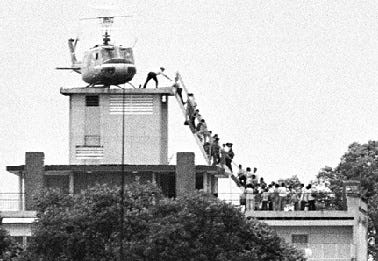That '70s Show
The awful execution of America's withdrawal from Afghanistan confirms we're reliving the 1970s.
Afghans desperate to flee their country as the Taliban seizes control swarm a departing U.S. transport plane. Photo courtesy NBC News.
I was born January 8, 1975, smack dab in the middle of the decade of the ‘70s. Once I was old enough to learn about what the ‘70s were about - in real time I believed they were mostly about Sesame Street and the violation of my personal autonomy posed by potty training - I didn’t and don’t like them one bit.
It was in the ‘70s that the post-war age of America first appeared to show real signs of deterioration. The economy sputtered and fell victim first to severe inflation and then to stagflation, which is the economic version of neither having your cake nor eating it. The policy response was atrocious. A Republican president instituted wage and price controls.
Internationally, Americans were tiring of the Cold War and especially its hot component in Vietnam. The withdrawal of U.S. troops from that country culminated in April 1975 with the chaotic evacuation of the U.S. embassy in Saigon, providing us with perhaps the most recognizable photograph of American failure and shame.
(Photo courtesy UPI/Hubert Van Es)
For a while now, the early 2020s have felt uncomfortably like the ‘70s, but with Covid instead of the really, really good music. We have inflation, rising crime, high gas prices, an interventionist approach to the economy, social unrest, a Democratic president following an impeachment-adjacent Republican one, plenty of facial hair and high-waisted jeans and, now, new images representative of our modern American malaise coming from Kabul.
The invasion of Afghanistan following the attacks, planned in that country with at least the acquiescence of the Taliban, of September 11, 2001, was mostly without controversy in the U.S. As with Pearl Harbor, our enemy had spilled American blood on American soil. Someone was going to pay.
Over time, and especially after the killing of Osama Bin Laden in neighboring Pakistan, public interest in remaining in Afghanistan waned. The last three presidents have all said they wanted to get U.S. troops out of the country. Like the decision to get into Afghanistan, the decision to get out was, outside a handful of conservative defense hawks, uncontroversial. The question was not whether to bring our troops home. The question was how to do it.
Disastrously, as it turns out. Like in Saigon 46 years prior, American forces scrambled to evacuate an embassy it was closing in a country it was leaving after tiring of the trouble of being there. Afghan refugees, some of whom had helped Americans versus the Taliban that was flooding into the city, swarmed American aircraft at Kabul’s airport. Some of them plunged to their death after clinging to the exterior of an American transport jet.
There remain thousands of American citizens in Afghanistan, now living with the immediate threat of reprisals by the Taliban:
An administration official who was not authorized to speak on the record told me that there are an estimated 10,000 U.S. citizens in the country, with the vast majority in or near Kabul. Some are residents, journalists or aid workers who may not want to leave. Most are scrambling to escape. Some are dual nationals or children of Americans who may not have the proper passport or visas, but the State Department has not told them how to fix their paperwork.
The chaotic withdrawal has, unsurprisingly, caught the attention of China’s state media, which issued an entirely unveiled threat to Taiwan:


President Biden, for his part, addressed the nation yesterday to defend his decision to withdraw American forces from Afghanistan, which entirely misses the point. Americans and the rest of the world are not shocked by our withdrawal; we’re shocked by the withdrawal occurring in an incompetent, dangerous and humiliating manner. I think, more than anything, Americans are ashamed of what they’ve seen out of Afghanistan in recent days. Biden’s address didn’t explain why the most powerful nation in the history of the planet failed to execute an orderly withdrawal. That is the central question and it is one that will now be litigated between the administration, the intelligence community and the military.
The images out of Afghanistan, like those out of Saigon two generations ago, indicate to the world that America is a combination of incompetent, impotent and untrustworthy. No amount of spinning or leaks to the media or blame-shifting will change that fact. Like in the 1970s, Americans now have images confirming their doubts about our standing and our future in an uncertain world.
Against Progressivism
Paid subscribers can access a post from late last week about progressivism. Here’s a taste:
The opposition to progressivism has to be the embrace of the founding ideals of liberty, equality and rule of law that made and make America the exception - the exceptional exception - to everywhere else, ever. Progressivism rejects those principles in favor of the government-above-the governed scheme that has haunted the vast majority of human beings ever to have existed. We should not allow them to succeed.
If you’re not yet a paid subscriber, you can join for just $5 per month ang get access to all the Oregon Roundup goodness.





